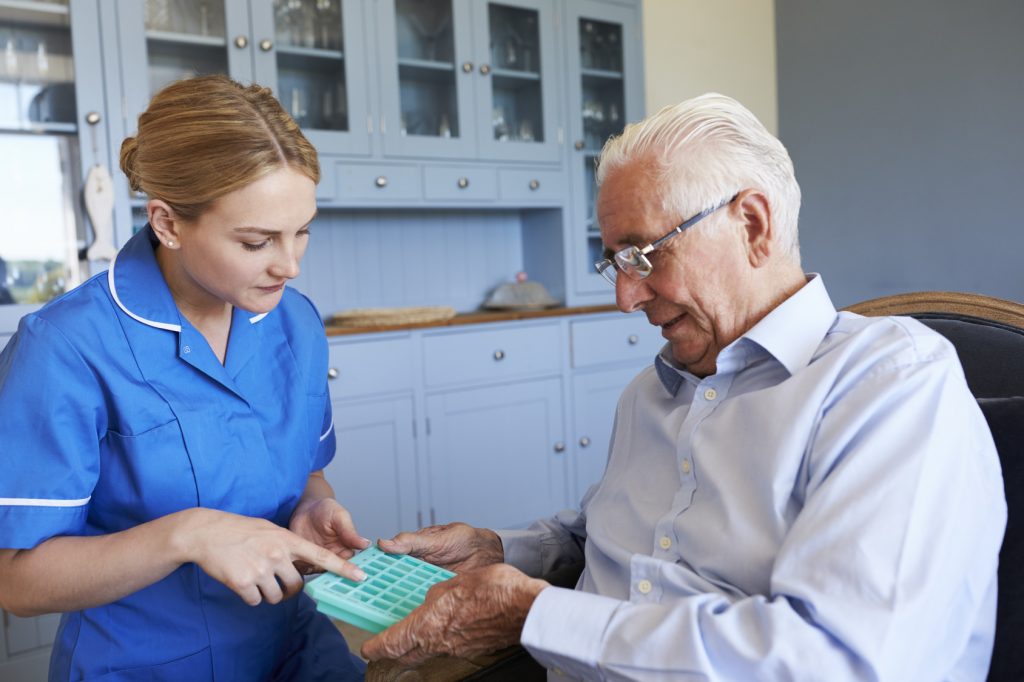What is Live-in Care?
Live-in care involves highly trained clinicians moving into people’s homes to assist with domestic tasks and medical needs. Regulated live-in care programs allow individuals to live independently in their own homes. In addition, home care services are a more cost-effective solution compared to residential care homes.
Leaf Complex Care provides services regulated by the Care Quality Commission (CQC), helping people feel more comfortable at home in their daily lives while being surrounded by their loved ones. These services may include 24-hour personal care, support with housekeeping tasks (preparing meals, cleaning, doing the laundry), mobility assistance, medication management, and emotional companionship.
Learn more about our GOOD and OUTSTANDING care our clinicians provide:
Bristol CQC Report Exeter CQC Report Slough CQC Report
Live-in-home care services offer person-centred, humanised care for individuals with complex care needs in their most familiar surroundings. As a care provider, we constantly tailor our care based on your needs, preferences and boundaries so that you receive support in a dignified and respectful environment.
What are Live-in Care Services?
Live-in care is an umbrella term that includes various services for individuals with different health conditions and complex needs. When you seek live-in care for a loved one, it is essential to assess their specific needs and find a humanised service to maximise their quality of life.
Below, we name the most common live-in care services we provide for individuals living with complex care needs:
- Positive Behaviour Support - a person-centred approach to helping individuals who experience behaviours of concern, living with autism, developmental disabilities, and mental health challenges
- 24-hour care - for individuals with complex needs who require humanised care and support 24 hours a day, seven days a week
- Companionship - emotional support which helps the people we serve nurture meaningful relationships with caregivers, friends and family members
- Convalescent care - short-term care at home for individuals in the process of recovery after health difficulties, injury, or surgery
- Dementia care - specialised care and support for people with dementia
- Respite care - a temporary arrangement that allows primary caregivers to tend to their needs while trained carers look after their loved one
- Palliative care - aiming to relieve symptoms and improve quality of life in individuals with life-threatening conditions
Conditions That Require Live-in Care
Live-in care is ideal for individuals with complex care needs and complex health conditions. Live-in carers can support people who have dementia, multiple sclerosis, and Alzheimer’s disease, as well as people living with severe learning disabilities, mental health difficulties and autism.

What is a Live-in Carer?
Live-in carers are healthcare assistants who provide interdisciplinary, round-the-clock support for people with complex care needs. A fully trained carer enables people to continue to live independently at home by supporting their healthcare needs and assisting them with everyday activities. These specialists provide live-in care tailored to a person’s requirements and preferences.
What is the Role of a Live-in Carer?
A live-in carer is a full-time healthcare assistant who moves into a person’s home to fulfil a wide range of care needs. Working as a practitioner in a live-in care agency involves providing bespoke one-to-one support for individuals with complex care needs while they remain at home.
Every live-in care service provider must offer fully managed support. For that purpose, a care manager typically supervises each support team and ensures they provide support and 24-hour care to the highest ethical standards.
Throughout the day, Leaf Complex Care’s live-in carers fulfil the following responsibilities:
- Personal care services - assistance with washing teeth, bathing, dressing, going to the toilet
- Mobility assistance - helping the individual with their mobility and assisting them with daily needs
- Medication management - administering prescribed medication and helping people with their well-being
- Complex support for individuals using medical aids - ranging from wheelchair, catheter, or stoma support
- Help with household tasks - cooking meals, cleaning, doing the laundry
- Engaging the individual in leisure activities - assisting people with shopping, visiting friends and relatives, and nurturing healthy hobbies and interests
- Providing companionship - offering emotional support and peace of mind to the individuals and their families
Specialist Live-in Care
Specialist care caters to the needs of individuals with complex care needs and conditions, such as dementia, Parkinson’s disease, multiple sclerosis, stroke, and cancer. With fully regulated, 24-hour care at home, people with complex care needs can continue to live close to their family members and retain their independence.
Practitioners in complex domiciliary care must pass special training to provide the right support for people living with these conditions. At Leaf Complex Care, our support workers undergo extensive training in order to provide humanised care.
What Qualities Does a Live-in Carer Need?
Providing regulated live-in care is a uniquely responsible and demanding role. Therefore, an excellent live-in carer needs to possess certain natural qualities and knowledge attained through comprehensive training.
Our organisation works with people who have the values of Family, Impact and Teaming, helping us work together to help people to live life to the fullest and, more importantly, on their own terms. The following traits are crucial for live-in carers to make an impact on people’s lives:
- Empathy - recognising other people's challenges and expressing genuine care about their well-being
- Respect - treating each customer with dignity and acknowledging their home as a professional environment
- Patience - willingness to always prioritise the individual's wishes and preferences, encouraging independence by helping people accomplish tasks on their own
- Observant and practical outlook - steady awareness of any changes in one person's health and behaviour, making sure that every difficulty is solved in a professional manner
- Friendly and outgoing approach - introducing yourself as a friendly and helpful healthcare assistant in the individual's life
What Does a Live-in Carer Need?
Before arranging live-in care for a loved one with complex needs, family members must consider several steps regarding the carer’s accommodation. A pleasant and welcoming environment will enable the live-in carer to excel in their role, dedicating their time and energy to providing high-quality support.
That being said, here are the essential requirements for accommodating a live-in care provider in your home:
- Bed and a private room - Access to a private space will allow the live-in carer to feel at home in the household. Live-in carers require a private room that offers enough space for their personal belongings and meets the basic standards of heating and ventilation. It is important to note that the carer's private room should be within the care recipient's hearing range.
- Access to a kitchen - Live-in carers require access to a kitchen to cook meals for the individual they support and for themselves, as they may not necessarily eat together.
- Access to a bathroom - While not every household can provide a separate en-suite bathroom, the shared bathroom should include clean and functional facilities for the carer.
- WIFI access - Providing access to a functional Wi-Fi network is necessary for several reasons, from security, safety to general well-being and leisure time.
Why Choose Live-in Care?
Live-in care is an interdisciplinary service that can help individuals with different levels of care needs. It is a humanised solution for people with complex needs and their families, enabling individuals to get the assistance they need in their family home, close to their loved ones. Access to the right care in the comfort of your home enhances independence, confidence, and general well-being. Depending on the individual’s needs, live-in carers may provide long-term companionship and support or short-term care in the recovery period after surgery.
Knowing that your loved one receives fully managed live-in care offers peace of mind for the whole family. Live-in care providers follow a personalised and prioritise the individual’s specific requirements and wishes. Experienced care providers are trained to handle symptoms of various conditions and behaviours that challenge, always maintaining quality of life and well-being.
Live-in Care Services
Live-in care services offer a compassionate and practical solution for individuals who require assistance with daily tasks but wish to remain in their homes’ familiar and comforting surroundings. This form of care provides personalised support tailored to the individual’s specific needs, promoting independence and enhancing overall well-being.
Here are the services that Leaf Complex Care’s live-in care can provide support with:
- Complex Care Services
- Rapid Response Service
- Transitional and Long-Term Care Services
- Mental Health Care Support
- Autism Care Services
- Learning Disabilities Care Services
- Challenging Behaviours Care Services
- ADHD Care Services
- Eating Disorders Care Services
- 12-Hour Shift Support Services
We are deeply committed to supporting individuals who live with complex needs, creating a better tomorrow, and helping people achieve greater independence through compassionate companionship and support.
Download our case studies that share the story of the individuals we serve, showing their resilience and strength and how we help them live life on their own terms.
Benefits of Live-in Care
Live-in care is a comprehensive, tailored approach for individuals with complex needs and their families. Access to live-in care allows people with a wide range of complex care needs and conditions to pursue an independent and fulfilling life whilst staying close to their loved ones. A fully managed live-in care team can provide the 24-hour support you need in the comfort of your own home.
Employing a complex live-in care team brings the following benefits:
- Receiving person-centred, bespoke, one-to-one care from trained practitioners 24 hours a day, seven days per week
- Retaining your tenancy as well as the company of your family and pets, regardless of the level and complexity of your care needs
- Keeping your independence and active role in the local community
- Receiving support with nutrition, hydration, and medication management
- Getting regular assistance with household tasks, such as cleaning and doing the laundry
- Preventing loneliness, isolation, and low self-esteem through meaningful companionship from your carer
- Receiving steady mobility support and reducing risks of physical injuries
A tailored live-in care program can provide stability and peace of mind for people with complex support needs and their families.
Live-in Care vs Care Home
The first advantage of live-in care, compared to a residential home, is that with live-in care, you can remain in the comfort of your own home, which can help reduce any distress about moving out and away from family. Your family and friends can still visit you in the same place, at any time.
The second advantage is that your mealtimes, diet, and other requirements will remain the same. A residential or care home often has specific mealtimes and a set menu to which you must adjust. Staying at home means you remain in charge and won’t have to adapt your preferences. You can still eat your favourite meals as often as you like.
One of the main advantages of live-in care is that you will have personalised support from the same carer, who is specifically trained for your needs. This differs from a residential home that provides different carers who visit at varying times. Live-in care is provided in the comfort of your own home with a carer that you are happy with.
In this aspect, you continue to have control over your routine. You still have the freedom to manage your daily life as you see fit. You can set your preferred schedule, and your carer will do their best to adjust. Their role is to ensure that all your needs and requests are handled. The difference with a care home is that they often require care recipients to adapt to a different lifestyle. For example, you might have breakfast or wash at times that are your preferred schedule.


As mentioned earlier, family and friends can visit as often as they want. Your family won’t need to worry about visiting times, signing in, or interacting with numerous carers. With live-in care, your family will have the chance to interact with the same carer each time they visit, giving them consistent feedback and information on how their loved one is getting on.
How to Find the Right Live-in Carer for You?
Finding a reliable carer is essential in ensuring live-in care for yourself or a close one with support needs. If you are in an ongoing search for a care provider that provides CQC-regulated services across the UK, Leaf Complex Care is the right choice. Our ultimate mission is provide humanised and proactive complex care support focused on a person’s privacy, dignity, and preferred lifestyle.
For our highly trained support workers, providing bespoke care is a higher calling. Leaf Complex Care’s experienced support workers imprint patience and kindness in every live-in care arrangement. They are impact-driven, compassionate, and dedicated to removing the social barriers imposed on individuals with complex care needs.
How Does Our Support Create Positive Outcomes?
Our care teams know the power of transformative person-centred care, supporting people’s unique abilities and strengths. Hayden’s journey is just one of many case studies that bring you closer to our commitment to our high principles of delivering the right care, the right support and the right culture.
Through Positive Behaviour Support, we worked closely with Hayden to understand the root causes of his behaviours and develop tailored strategies to help him manage them effectively. One key element of our approach was building a solid rapport with Hayden, gaining his trust, and understanding his unique needs and preferences. We focused on creating a supportive environment that empowered Hayden to communicate his feelings and needs effectively. Our team of dedicated support workers implemented a structured routine and provided Hayden with clear guidelines, helping him feel more secure and in control.
Through consistent and compassionate care focused on Hayden’s abilities, he became more self-aware and developed coping mechanisms to regulate his emotions and responses.
Hayden’s mother, Jaycee, reflects on his transformation: “Hayden is happy and can go and choose the activities he wants to do. Hayden has two carers who support him every day. They have built a great relationship with him. They know him very well, almost as well as us as parents. They can see him getting dysregulated before it happens, which often makes the whole difference to the day because it gives him a chance to be supported at the moment and do what he loves the most.”
Leaf Complex Care offers cost-effective live-in care for people of any age in Bristol, Slough, Somerset and the Midlands.
Contact us today, and we will outline a tailored plan according to your needs and preferences.







